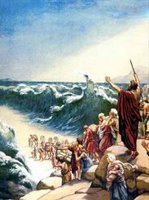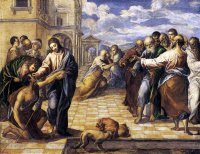Give Thanks to the Lord
 Should we survive too much turkey, too many relatives, and all those football games, perhaps we’ll have time to thank God for all He’s done for us. John Milton wrote a hymn to celebrate the Lord’s blessings: “Praise, oh, praise, our God and King, Hymns of adoration sing; For His mercies still endure, Ever faithful, ever sure.”
Should we survive too much turkey, too many relatives, and all those football games, perhaps we’ll have time to thank God for all He’s done for us. John Milton wrote a hymn to celebrate the Lord’s blessings: “Praise, oh, praise, our God and King, Hymns of adoration sing; For His mercies still endure, Ever faithful, ever sure.”Our American celebration of giving thanks grew somewhat directly out of the Pilgrims’ response to God for a good harvest after a rough first year in the New World. But they weren’t the first to have some sort of harvest festival. Ancient Israel, as well as its pagan neighbors, had similar celebrations as the grain was gathered and stored. Greeks, Romans, northern Europeans, and others partied when the spring and summer’s farming was over and their hard work rewarded. If you have some German blood, or have lived up north, you’re probably familiar with “Oktoberfest.” These days of partying also grew out of harvest festivals.
 The Bible clearly tells us that being thankful is not enough: Who we thank and why we give thanks are essential. Ours is not only a God who fills bellies; an inventory of His blessings reminds us of all the physical and spiritual blessings He gives. The pagans — of Bible times and elsewhere — would thank their gods. But they worried constantly that the gods would forget them, so their fears grew into superstitious practices. In some places, giving thanks devolved into drunken parties as grapes and grain were gathered.
The Bible clearly tells us that being thankful is not enough: Who we thank and why we give thanks are essential. Ours is not only a God who fills bellies; an inventory of His blessings reminds us of all the physical and spiritual blessings He gives. The pagans — of Bible times and elsewhere — would thank their gods. But they worried constantly that the gods would forget them, so their fears grew into superstitious practices. In some places, giving thanks devolved into drunken parties as grapes and grain were gathered.Our God doesn’t forget us. He even feeds the wicked, sending life-giving rain to those who don’t deserve it. But He’s not only our God for this life. Because of His mercy, He also acted in Christ Jesus to be our God for all eternity. Thus, our thanksgiving is most of all for the gift of God which is eternal life.
We don’t need to remind God to bless us. We don’t even need to thank Him. Yet, it is good to thank Him and to ask Him to continue to supply our needs of body, mind, and soul. Psalm 136, the basis of Milton’s hymn I quoted, mentions giving thanks because “he gives food all flesh.” But it also praises Him because “he is good, because his steadfast love endures forever.” The Psalmist reminds us that this is the God of gods, the Lord of lords, the Doer of miracles. He’s the One “who by understanding made the heavens.”
 It jolts us as we read through the 136th Psalm to find, “Give thanks to the one who struck down the firstborn of Egypt, for his steadfast love endures forever.” But this leads to God calling His people out of slavery, stacking up the waters for His people’s passage, then overthrowing “Pharaoh and his host in the Red Sea.”
It jolts us as we read through the 136th Psalm to find, “Give thanks to the one who struck down the firstborn of Egypt, for his steadfast love endures forever.” But this leads to God calling His people out of slavery, stacking up the waters for His people’s passage, then overthrowing “Pharaoh and his host in the Red Sea.”For His own, God even does what is unpleasant to Himself. Author of creation and the Lord of Life, He brings death to His own creatures when they oppress those who follow Him. He also brought death to His only begotten Son to grant sinners an exodus from the bonds of Satan. “He struck down great kings,” as He led His people across the Jordan River into the land they’d rule as an inheritance for His servant Israel. By striking down Jesus, the King of kings, He also struck down the prince of demons, the devil.
We’re not only thankful during the good times, but even when things are bad. Our God who promised through the apostle Paul to lead us through all things: “We know that for those who love God all things work together for good, for those who are called according to his purpose. (Romans 8:28)” Likewise Psalm 136: “He remembered us in our low estate ... and rescued us from our foes.”
 The Psalmist concluded: “Give thanks to the God of heaven for his steadfast love endures forever.”
The Psalmist concluded: “Give thanks to the God of heaven for his steadfast love endures forever.”Milton ended the hymn by saying, “Glory to our bounteous King, Glory let creation sing; Glory to the Father, Son, And the Spirit, Three in One!”
Will you join Christ’s Church in a never-ending Thanksgiving Day, celebrating our God and all this Psalm and hymn remind us of, because “his steadfast love endures forever”?
Scripture quoted from The Holy Bible, English Standard Version™, © 2001 by Crossway Bibles.
Send email to Ask the Pastor.
Walter Snyder is the pastor of Holy Cross Lutheran Church, Emma, Missouri and coauthor of the book What Do Lutherans Believe.

1 Comments:
I enjoyed this post very much, Pastor Snyder.
Post a Comment
<< Home